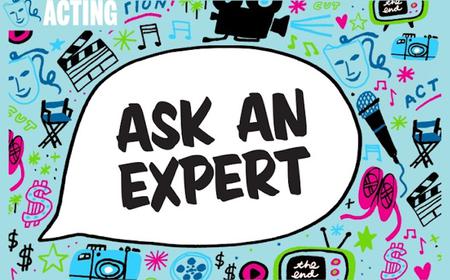
There are many ways to make a living as an actor. For some, it means starring roles and a foot-long IMDb page. But that certainly isn’t the only way. Background acting—or “extra” work for movies and TV—can absolutely be a full-time profession if you know how to go about it. In this in-depth guide, we’ll walk you through how to become an extra in a movie or TV show, what it’s like on set for background actors, and how much extras get paid.
JUMP TO
- What is a background actor?
- What is a featured extra?
- How to be an extra in a movie or TV show
- How to find movie extra jobs
- How much do extras get paid?
- A day in the life of an extra
- Dos and don’ts of being an extra on set
- Is being a movie or extra worth it?
- Should I put extra work on my acting résumé or demo reel?
A background actor, or extra, is a nonspeaking role; extras appear frequently in the background of television or film productions, intended to round out the scene for realism’s sake. They could be spectators at a baseball game, audience members at a comedy club, or just people strolling through Central Park—these are all common background roles.
Is there a difference between “background” actor and an “extra”?
There is not! You may hear “background” used instead of “extra” because, frankly, it sounds a little more sophisticated. But a background actor is the exact same thing as an extra.
A featured extra is a background actor who gets a little more screen time. Maybe they pour the lead a latte, deliver a newspaper to their doorstep, or catch a fly ball—meaning that it’s more likely for a featured extra to be recognizable in the final episode or film. "Featured extra" is not an official SAG-AFTRA designation, however, and doesn’t translate into additional pay.
Another thing to remember: featured extras still don’t speak on camera. If they have even a one-word line, they’re now considered a “co-star.” Co-stars have five lines or less; generally, they’ll only be required for one day of shooting, though that’s subject to change. Unlike extra work, you absolutely can put co-starring gigs on your acting résumé when trying to land speaking roles. Also unlike extra work, almost without exception, productions will require co-stars to be members of SAG-AFTRA.
Becoming an extra is much simpler than becoming an actor: you need a recent headshot, and that alone will enable you to apply for gigs, though an acting résumé with any background work you've done can help you land a part. “What we’re looking for in a submission is a picture that represents yourself,” says Grant Wilfley of Grant Wilfley Casting, which handles most background acting work in New York.
“We’re not interested in retouched professional headshots if they are not an accurate representation of what you look like,” Wilfley continues. You can even use a photo you took yourself, provided it shows that you took your submission seriously. Don’t use “an out-of-focus shot of yourself where you can only see half of your face. That’s not super helpful. It may show your quirky personality, but it’s not showing what you look like, and that’s really the most important thing.”
To become an extra, you don’t need a SAG card, either. Even if the project itself is SAG-AFTRA, you are not required to be a dues-paying member of SAG-AFTRA in order to get hired as a background actor. It’s also worth noting that background acting work can count toward qualifying for joining the union if that’s something you’re thinking about down the line.
There are two main ways to find work as an extra:
- Sign up for an online casting platform like Backstage
- Network with other actors
Backstage posts hundreds of casting notices per week—many of which are seeking background actors (here’s a real-life example of a call for “1960s types” for Season 4 of “The Marvelous Mrs. Maisel”). You can filter these gigs even further by age, gender, and location to ensure you’re finding the most promising leads. If you do decide to register for a casting site, you’ll be asked to provide a physical description and a recent photo or headshot. “Fill in all of this information honestly,” advises actor Bill Coelius. “You’ll get hired based on what you look like, not what you want to look like.”
Coelius also advises aspiring extras to work their industry connections. “Talk to every actor you know; ask if they’re doing background work and where they found it,” he says. “If you ever pass a production on the street, kindly ask anyone with a headset if they know who they hired their extras from. I did this once, called the agency, and was on the set as an extra the next week. If you know any production people, ask them for a referral.”
A common rate for a single day of background work is between $100 and $200, though extras are paid differently depending on their union status. Generally, nonunion talent will be hired for either a 10- or 12-hour day, with additional pay provided should production run overtime.
SAG talent earns more—sometimes a lot more—than their nonunion counterparts, but pay is much less uniform. The base rate for background work in 2023 is roughly $187 per day, but there are a number of stipulations that affect that number. For instance, an extra will be paid more if:
- They are required to get wet (unless provided with swimming or surfing gear) or work in a smoke-filled environment
- They personally provided certain props, such as pets or golf clubs
- Body makeup or oil is applied to more than half their body
- They use special skills such as tennis, ice skating, horseback riding, or driving a motorcycle
To learn more, check out the official SAG-AFTRA handbook for background actors.
As a movie or TV extra, expect long days on set. You may be one of the first in and the last out. “You’ll spend most of your time waiting to be called, so bring reading material or something to keep you occupied,” advises actor Amy Russ.
But you’re an actor, which means there is always work to be done. While standing around as the principals block or waiting for your next scene, get a jump on your next audition and study the sides. You can also research for your next TV gig and catch up on previous episodes, or read a novel that will help deepen your character development for the next project. You can also use the time for self-care: knit, meditate, enjoy some good-natured spacing out—you’re getting paid to do it!
And whatever you do, don’t forget your phone charger!
As an extra, you aren’t on set to “get discovered.” In fact, the way you’ll make an impression is by being on time (that means early!), behaving in a professional manner, and generally keeping your head down. Unless explicitly called for, you should not approach the director or principal actors, and you should try your very best not to make additional work for anyone.
“When you get that call, understand this is a business and you must treat it as such,” actor Amy Russ says. “That means if you accept a job, it’s critical to show up on time and follow the directions of the assistant director.”
That’s another thing: you’ll likely be receiving instruction from the assistant director. If you have a truly important question, try to find the appropriate moment to ask. But keep in mind that the AD is extremely busy—any minute spent speaking with you is time that could probably be spent elsewhere. “Of course, make sure you’re not in the way,” Russ adds. “Be discreet, follow directions, and be professional at all times. This is not the time to get an autograph.”
As an extra, you are entitled to the on-set meals provided, as well as “crafty” (the on-set term for the craft services table). Of course, be respectful—i.e., don’t shove mini cereal boxes in your bag on the way out.
Being an extra is a no-pressure way to gain firsthand experience on a set, make valuable connections, and get paid to watch experienced actors and creatives work. But if you’re trying to figure out how to go from extra to principal actor, extra work may not be worth it. “If you want to shift into bigger roles, my advice is to limit how many background jobs you take,” actor Amy Russ says. “Do them for a little while until you feel confident and understand the workings of a professional set, then focus on auditioning for bigger jobs.
"When I did get a role, I already knew what to expect, so I could concentrate on my acting work instead of trying to figure out what was going on all around me. I can’t tell you how glad I was to have those prior experiences under my belt.”
What if you’ve already worked on student films or smaller nonunion gigs? “While the lexicon is the same, there is simply no comparison to the hustle, bustle, and sheer magnitude of a well-oiled, big-budget production,” Russ adds. “My feeling is you should give yourself every opportunity to gain experience and firsthand knowledge so you’re super confident when you get your first big-budget role!”
If you’re submitting to speaking roles, you shouldn’t list extra credits on your résumé or put those scenes on your demo reel. “Few folk in the industry read ‘extra’ on a résumé and get excited about you as an actor,” says Paul Barry, a Los Angeles-based acting coach. “Though there’s no shame in the work, if you keep popping up as an extra or featured extra, you’re likely to cement that perception of you in the industry, regardless of how empathetic they are to your plight as an up-and-coming artist. Casting directors will look at your résumé then for the training you’ve taken, not for the projects in which you walked behind Jennifer Aniston, or handed a glass of wine to George Clooney.”
These rules, however, only apply for those who want to do principal work. If you’re submitting an acting résumé for another background gig, then of course you should have your glossiest extra credits listed. For career extras, it’s perfectly fine for your entire résumé to be nothing more than background credits.
Ready to get on camera? Check out Backstage’s extra audition listings!

 How to Get Work as an Extra (and Be Great at It)
How to Get Work as an Extra (and Be Great at It)  What to Expect When Working as a Background Actor
What to Expect When Working as a Background Actor  How to Be the AD’s Favorite Extra on Set
How to Be the AD’s Favorite Extra on Set  14 Reasons Extra Work Won’t Jumpstart Your Career
14 Reasons Extra Work Won’t Jumpstart Your Career 


















